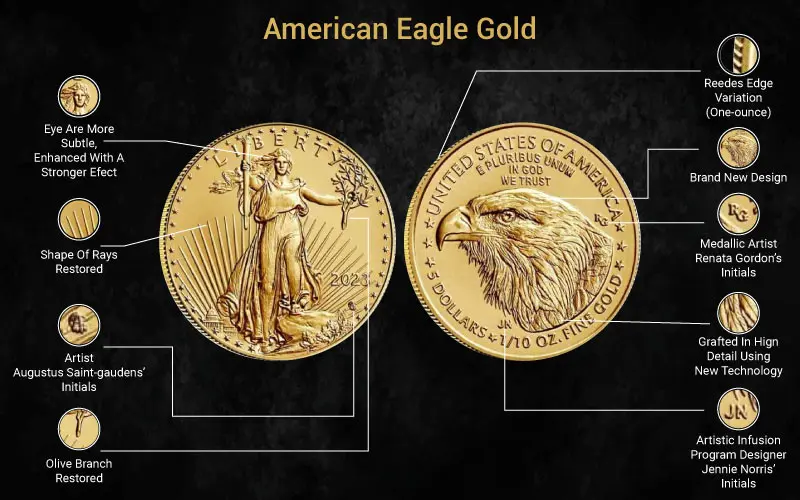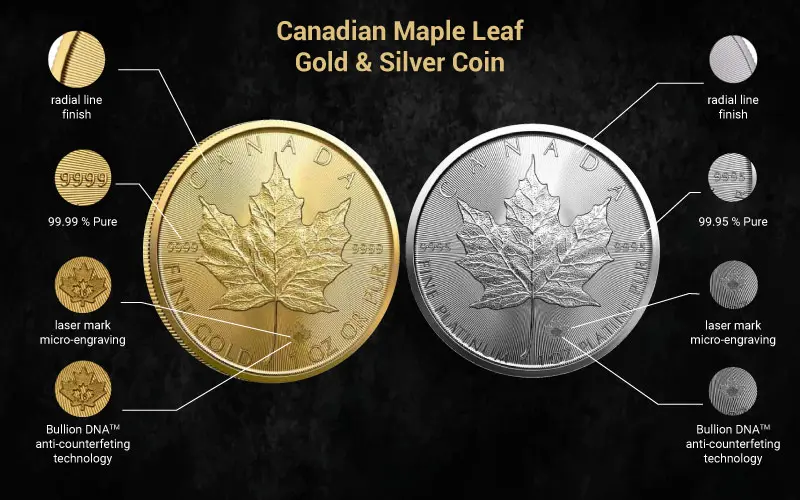
As a collector, investor, or simply someone interested in acquiring precious metals, it is essential to understand the various security features implemented on coins, currency, and bullion. The purpose of these security features is to protect against counterfeiting and ensure the authenticity of the item being purchased. This article will take a detailed look at the security features commonly found on coins, currency, and bullion and why they are essential.
Before delving into the distinct security elements of the world's most recognized refineries, let's take a look at the numerous security aspects available globally at a glance:
Assay security features are crucial to the precious metals industry, where the authenticity and purity of metals such as gold, silver, and platinum are of utmost importance.
Assay marks guarantee quality and are placed on the metal product by an assayer or a hallmarking agency after testing and certifying its purity. The marks typically include information about the metal's fineness, weight, and other essential details. These marks are critical in preventing fraud and ensuring buyers get what they paid for.
Many assays security features have been introduced in recent years to strengthen the authentication process further. For instance, some mints use tamper-evident packaging that doubles as an assay certificate. The package contains a unique code that can be verified online, providing an additional layer of security.
Additionally, some mints use anti-counterfeiting technology like micro-engraving and laser-etching to create intricate designs and patterns on the surface of the metal product. These features make it harder for fraudsters to replicate the product and help buyers to distinguish between genuine and counterfeit metal.
Microprinting is one of the most common security features on coins, currency, and bullion. This printing process creates minimal text that is difficult to replicate, making it nearly impossible to counterfeit. As a result, microprinting is often used on the edges of coins and the faces of banknotes.
Security threads are another common feature found on currencies or banknotes. These threads are embedded into the paper and can be seen when held up to the light. In addition, the threads are often imprinted with the banknote denomination and are another layer of protection against counterfeiting.
Raised printing is a printing process that creates a three-dimensional effect on the coin's surface. This feature provides an added layer of security and makes it more difficult for counterfeiters to replicate the coins, especially antiqued coins.
Mint marks are unique markings on coins and bullions to indicate where the coin was minted. This feature helps to ensure the coin's authenticity and can also be used to identify the rarity of the coin.
Laser etching is a process that uses a laser to create intricate designs and patterns on the surface of the coin or bullion. This feature provides an added layer of security and makes it more difficult for counterfeiters to replicate the item.

The production of 2021 American Eagle gold and silver coins from the United States Mint features advanced anti-counterfeiting technology to ensure the authenticity of the coins and prevent counterfeiting. The Mint has taken severe measures to achieve this goal:
The Mint's efforts to combat counterfeiting include its partnership with the U.S. Secret Service and the temporary suspension of the Mutilated Coin Redemption Program in 2015. The U.S. Mint is committed to revising its regulations and ensuring it is free of fraudulent activities. This investment in anti-counterfeiting technology and resources is a positive step towards safeguarding the authenticity and value of American currency.

The U.S. Mint's commitment to this goal ensures that the public can have confidence in the integrity and value of the coins produced by the Mint.
PAMP Suisse bullions are top-rated not just for their exceptional qualities but also for their advanced security measures. PAMP Suisse implements state-of-the-art anti-counterfeiting technology, such as CertiPAMP™ packaging, that serves as an assay card and safeguards the bars.
These security features apply to all bars, including gold, silver, platinum, and palladium. Moreover, PAMP has introduced Veriscan™, which scans and digitally maps the unique surface of each bar, providing an unequivocal authentication method that surpasses traditional measures like a serial number and assay certificate, which swindlers can forge.
Veriscan™ is the most reliable way to verify the authenticity of PAMP bullions.

The Royal Canadian Mint is a highly reputable institution that produces coins, bullion bars, and other precious metal products. One of the reasons why the Royal Canadian Mint is so respected is because of its innovative security features. For example, the Mint uses Bullion DNA, a unique and proprietary technology that allows for authentication and traceability of its bullion products like Gold Maple Leaf coins dated 2014 and later and Silver Maple Leaf coins dated 2015 and later.
Each bullion bar or coin contains a micro-engraved security mark that can be verified using a particular reader. The security mark carries information about the product's origin, purity, and other vital details. This technology gives customers peace of mind, knowing they are purchasing genuine Royal Canadian Mint products.
Another security feature that the Royal Canadian Mint employs is its radial line finish. A pattern of exact lines carved onto the surface of coins and bullion bars. The lines create a light-diffracting effect that gives the product a distinctive appearance and serves as a security measure.
In addition, the Royal Canadian Mint has also introduced micro-engraved radial lines in some of its other products, providing an additional security layer. With these advanced security features, the Royal Canadian Mint ensures that its customers can trust the authenticity and quality of its products.

The British Royal Mint introduced new security features to its silver and gold Britannia coins to enhance their anti-counterfeiting measures.
These new security features highlight the Royal Mint's commitment to protecting its customers and maintaining the integrity of its products. They ensure that buyers of silver and gold Britannia can purchase with confidence, knowing they receive genuine coins of the highest quality.
Graded coins are one of the most sought-after investments by collectors and enthusiasts alike. But with their rising popularity, the risks of fraud and counterfeiting have also increased. Therefore, you must know about the security features of graded coins that you must watch out for.
One such feature is the hologram seal, a tamper-evident device that ensures that the coin has not been opened or manipulated. The seal is usually placed on the graded coin holder and contains a unique serial number that the grading company can verify.
Another security feature to watch out for on graded coins is micro-engraving. It is a process in which a microscopic image or text is engraved onto the coin's surface. The engraving is visible only under magnification and cannot be replicated easily, making it an effective deterrent against counterfeiting.
Many grading companies also use ultraviolet light to detect any signs of tampering or alteration on the graded coins. They can also use microscopes to examine the coin's surface for imperfections or anomalies. By keeping an eye out for these security features, you can be sure that the graded coins you purchase are authentic and of the highest quality.
United States currency is used worldwide and has various security features to prevent counterfeiting. The most commonly known feature is the watermark. Watermarks are images embedded in the paper and visible when held up to the light. For example, the watermark of Benjamin Franklin's face is on the $100 bill, and George Washington's portrait is on the $1 bill.
Also, another security feature is color-shifting ink that appears to change color when viewed from different angles.
In addition to these features, the United States currency has raised printing that is noticeable to the touch. This feature is unique to the currency and provides an added layer of security to the bills. However, each currency has a distinct feel, and counterfeiters find it hard to replicate the raised printing.
Moreover, the currency has security threads that glow under ultraviolet light. For example, the $100 bill has a 3D security ribbon that changes color when tilted back and forth, and the $50 and $10 bills have a blue security thread that glows under UV light. By ensuring the authenticity of the currency, you can be confident that your transactions are secure and your money is safe.
In commerce, stacking, and collecting, the authenticity of the goods is of utmost importance. To ensure the protection of everyone, a range of security features, measures, and enhancements have been implemented. However, to safeguard themselves even further, collectors should consider adding to their collections from a trusted source such as boldpreciousmetals.com.
When purchasing coins, bullion, and other collectibles, it can be challenging to know whether they are authentic. Counterfeiting and fraud are significant concerns that can lead to a loss of money and reputation. Hence, collectors must take extra precautions to ensure they only buy from trusted and reputable sources.
boldpreciousmetals.com is a reliable and trustworthy supplier that provides collectors with a range of certified, high-quality collectibles. This way, collectors can be confident that they are getting authentic and genuine items evaluated and authenticated by experts.